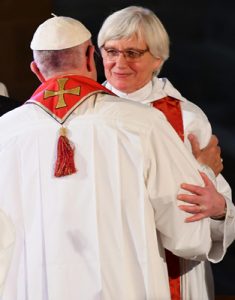https://onepeterfive.com/author/aseng/
In considering the question of Catholics joining in non-Catholic worship, the constant and uniform testimony of Scripture and Tradition must be maintained: Catholics may never actively participate in non-Catholic worship. This prohibition follows chiefly from the First Commandment in light of the fact that all non-Catholic worship is false, actions standing contrary to right faith and in violation of both natural and divine law. Such acts are therefore objectively disordered, independent of the subjective culpability of those who engage in such worship.
A second, closely connected reason for this discipline is that of making a lie by demonstrating a false religious unity: for a Catholic to join in non-Catholic worship is to manifest a certain unity with that community, contradicting the true unity of the Church. This leads to a third reason of scandal: Catholics who actively engage in false worship give the objective impression that such disordered acts are permissible, even laudable, and in this way endanger right faith (on the part of Catholics) and confirm non-Catholics in their error. A final reason for this prohibition is that it involves an omission of fraternal charity: by engaging in false worship, the Catholic fails in his duty to mercifully instruct the ignorant, admonish the sinner, and share the Gospel.
It is therefore doctrinally indefensible to admit of a discipline – alien to the constant and uniform tradition of the Church – that would permit (much less encourage) the active participation of Catholics in non-Catholic worship. That many Catholics today do so anyway (sadly, often encouraged by priests, bishops, and popes) is neither contested nor excusable. We leave questions of culpability to the God, who alone judges hearts; however, we may certainly condemn actions that run contrary to what has been believed “always, everywhere, and by all.” When such actions violate what is holiest, highest, and best, it becomes even more pressing to act.
Furthermore, it should be noted that traditionally, if Catholics might be permitted a certain passive participation in occasions of false worship, this was admitted only if the instance was: 1) an extraordinary circumstance, 2) commended by some grave reason, and 3) not overtly scandalous. The cautious qualifications here reflect the gravity of the act in question and recognition of the fact that any form of worship is informed by the beliefs of the worshipping community, demonstrating and effecting their religious unity as well. Thus for a Catholic, even passive participation in non-Catholic worship is a question that must be weighed with great caution.
One typical example given for such potentially permissible passive participation is that of a Catholic attending the non-Catholic funeral of a close relative or friend, provided that fraternal charity truly compels it and there be no danger of scandal or harm to right faith. Even here, it is noteworthy that such participation was only ever admitted as a possibility, and on the assumption that the person was seeking the direction of legitimate pastors in good faith, in order to act well.
As sketched above, such restrictive criteria for a truly Catholic discernment are seen to depend above all on appreciating the real gravity of the moral evil involved – false worship – and on the potential danger to man’s most precious gift of faith, the violation of which is the most grievous of sins (cf. Summa II.II.10.3).
